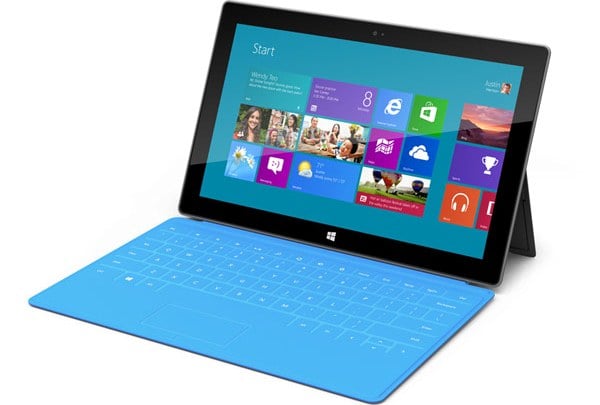Microsoft Corp. (NASDAQ: MSFT) has entered into a new era. With Satya Nadella in charge as Chief Executive Officer, Steve Ballmer and Bill Gates are out as far as running the daily operations. Nadella’s efforts so far are being met with praise, but this is very cautious praise. Microsoft has been so unpopular for so long that people just have a hard time believing that its turnaround can be made. Source: courtesy of Microsoft
Source: courtesy of Microsoft
Perhaps the real issue to consider in Microsoft’s turnaround are what items are weighing on the company. Even more important than identifying the problems is coming up with the proper real-world solutions to those issues.
24/7 Wall St. wanted to identify the biggest threats and hurdles that lie ahead for Microsoft. These are issues which are current, but they could also persist for years. Some of the issues could likely take years to remedy even if they are executed upon with perfection.
Microsoft shares fell 2.8% to $39.87 on Friday as the Nasdaq Composite Index had its worst point loss since 2011. The drop felt even more extreme when you consider that Microsoft shares hit a 52-week high and decade high of $41.66 just this week!
Many of the hurdles in Microsoft’s way are already being addressed. Some have yet to be addressed. So some of these may seem redundant or known. Others, however, remain up in the air, and it will take time to be the verdict of success or failure.
These are 10 hurdles and threats that could get in the way of Microsoft’s future success.
Bill Gates and Steve Ballmer
Bill Gates may now mostly be a great philanthropist focused on international charity and goodwill efforts, but he still owns well over 300 million shares of Microsoft. Steve Ballmer also implemented a turnaround strategy before he left, and Ballmer has reportedly not given up all control that a new CEO may need to succeed. In short, Bill Gates or Steve Ballmer could drastically impede Satya Nadella’s ambitions. He may have the best ideas in the world, but if the two guys who had to sign off on Nadella do not want to go they may hold his plans back. It is going to take time to see if Nadella can say, “You trusted me to take this role, now I am taking this direction, and you are just going to have to trust me on it or fire me over it.”
A Generation Gap on the Board of Directors
Satya Nadella is 46 years old, but as CEO he is the youngest board member who works daily at Microsoft. The addition of G. Mason Morfit of ValueAct to Microsoft’s board of directors was not just smart. It was crucial, as he is just under 40. In 2013, we wrote how Microsoft’s ancient board of directors may be one of its single largest problems. It was stacked full of a bunch of old guys who thought that desktop PCs located inside an office suite or cubicle was the best thing since sliced bread. That being said, this board still needs to be expanded AND expanded with younger tech-savvy geniuses who are not married to a future of desktops and laptops. Nadella’s cover sheet says that Microsoft’s opportunity ahead is vast, but he admits that the company has to move faster, focus and continue to transform. If the board does not agree on a direction, that effort could end up being a paradise lost.
The Office Empire
Microsoft’s billions upon billions of dollars added to its Treasury have come largely from sales of Office products. Microsoft made a huge splash when it released its version of Office for iPad. This is a coup that makes the Office platform agnostic — for both the device and the operating system. Microsoft also has Office 365 as a subscription service, often for dirt cheap. Still, a declining PC market and a declining Windows share ultimately will mean fewer and fewer $200 and $300 software sales. It will likely be years before the full extent of the Office empire’s future is known. Will Google’s Spreadsheet, Document, and Presentation get good enough to usurp Office? Or what about OpenOffice? Again, there are threats.
Hackers & Security
The public is scared of hackers and fearful about data security. Now imagine being a technology giant that can theoretically be wiped off the map by teenagers from somewhere else in the world. It happens, and companies who provide software, data, entertainment, and hardware all have to worry about this security threat. Quite literally, this is just like the defense sector having to worry about its weapons of warfare being stolen or destroyed. There is even some concern that hacking could cause the next world war, and that is far from just the National Security Agency snooping concerns. Now imagine that you run Microsoft: You know that if a rising hacker would have the greatest “victory” of a hacking career, it would be saying “I took down Microsoft.”
Continued PC Market Deterioration
The personal computer market is still sliding, and it’s expected to slide in 2014 and beyond. As smartphones and tablets have taken over, it seems that more and more of the world is heading toward a world without a desktop PC. That means less and less of a chance that Windows will be touching everyone like it did in the 1990s. Unfortunately, this trend is not likely going to change. There is a silver lining, however. Don’t count the PC market dead any time soon, for both laptops and desktops. Business people often cannot avoid using a PC. If you are in research, finance, design, technology or any field requiring consistent internet access for things besides just email and social media, chances are high that you still have not come anywhere close to buying your last computer.
Mobile Wars
The death of PC market may be an exaggeration, but the rise of smartphones and tablets has left Microsoft in the dust. Sure, the efforts mentioned previously are aimed at helping to eliminate that. The Nokia deal and Windows phones and tablets also are aimed at this segment. The problem is that market share is still going to other companies. Apple Inc. (NASDAQ: AAPL) and Google Inc. (NASDAQ: GOOG) dominate the mobile web now, and Microsoft may have to just live with being an addition or an option rather than being the dominant player that it would like to be. As a reminder, much of the world has never used Windows because their primary or only web access is a phone or tablet. Nadella has prioritized mobile, and we will have to see in time how that turns out.
Read Also: Will A Falling Netflix Stock Tempt An Apple Buyout
Apple and Google
While much of the rise of Apple and Google has been addressed already, the reality is that Main Street is just more excited about Mac, iOS, Android, Google, Safari, and many other things. Maybe Satya Nadella can change that by bringing more youth, but Millennials have moved away from Microsoft in many ways. They just flock to Apple or Google as if Microsoft should be avoided. That behavior is very hard to change, and it is a change that does not happen overnight. For some reason, the consumer does not complain when Apple or Google take on predatory or monopolistic tactics against other companies. That was not true when Microsoft did. It just seems that the public holds different standards here. Again, that is something else hard to overcome. In online Search, Google currently has more than 67% of the US search market versus just over 18% for Bing and just over 10% for Yahoo! Google also dominates in advertising.
Xbox Competition, And Not Just From Games
Microsoft has created a boom with its Xbox launches over the last decade. Games like Halo have been massive hits. Now there is Titanfall. Still there is huge competition here. Sony Corp. (NYSE: SNE) has the PlayStation 4. And there are dozens of mobile games that are either free or considered to be “freemium” games. The new Xbox One goes far beyond gaming. This is a risk, even if it is a boom. Another risk is a price war. Some investors and consumers actually wonder if the media and Xbox efforts will still be a part of Microsoft in the years ahead. The Xbox is just one of the tools used by cord-cutters to avoid subscribing to cable and satellite subscriptions that can run a household $100 to $200 a month. Amazon.com, Inc. (NASDAQ: AMZN), with its Fire TV announcement of late, is just the latest of many threats here.
The Cloud & Enterprise
The Cloud is an opportunity and a threat for Microsoft. The market for enterprise software is in constant change, and maybe for lower and lower pricing. Fortunately, if one man can help Microsoft excel here it is none other than Satya Nadella. Most recently, Nadella was executive vice president of Microsoft’s Cloud and Enterprise group before accepting the role of CEO. We have already seen some efforts here with Nadella declaring that the cloud and mobile would be the priority. The risk in not moving fast here is obvious: A slew of competitors will eat away at Microsoft like a zombie hoard on the elderly. The risk of moving too fast is that old-world revenues can be eaten into at a much faster rate than investors would prefer.
Also Read: How Intel Plans to Move on from PCs
Wall Street and the Media
The media and Wall Street both favor Apple, Google, Amazon, and a slew of other companies over Microsoft. Of course, that can change. It is just not easy to enact that change. Google’s Sergey Brin and Larry Page just seized control from shareholders, yet no one is screaming bloody murder. Tim Cook’s greatest contribution at Apple has been new colors and new sizes, and maybe China Mobile. Jeff Bezos gets to run Amazon on almost no margin at all. Microsoft just seems to never get such a break. And even though Microsoft shares hit a decade high this last week and is up nearly 50% since the end of 2012, the stock trades above the $39.60 consensus price target from Wall Street analysts. Microsoft even has a 2.71% dividend yield. Apple has a 2.26% yield, yet analysts think its value is 11% higher. Google pays no dividend, and analysts think it has more upside even after the split.
So, what wasn’t brought up? Well many things. These are 10 real threats and hurdles that the company faces today that can impede its turnaround efforts. There are many side businesses of Microsoft, and there are many holdings which may not seem to be the core of the company’s future. At the end of the day, Satya Nadella is right that Microsoft has a tremendous opportunity in the future. That tremendous opportunity also comes with many hurdles that have to be overcome.
Essential Tips for Investing: Sponsored
A financial advisor can help you understand the advantages and disadvantages of investment properties. Finding a qualified financial advisor doesn’t have to be hard. SmartAsset’s free tool matches you with up to three financial advisors who serve your area, and you can interview your advisor matches at no cost to decide which one is right for you. If you’re ready to find an advisor who can help you achieve your financial goals, get started now.
Investing in real estate can diversify your portfolio. But expanding your horizons may add additional costs. If you’re an investor looking to minimize expenses, consider checking out online brokerages. They often offer low investment fees, helping you maximize your profit.
Thank you for reading! Have some feedback for us?
Contact the 24/7 Wall St. editorial team.



